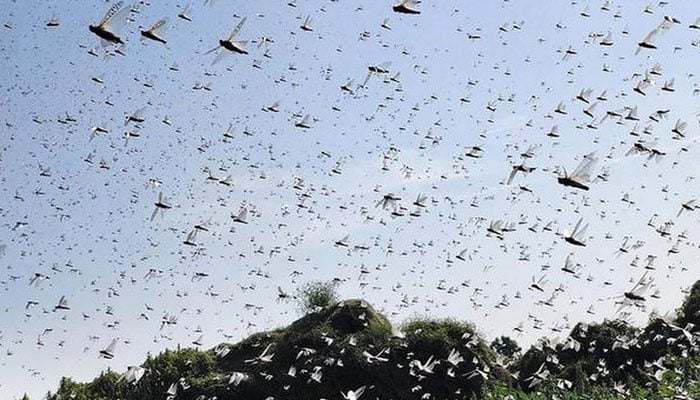Locust attack: India looks to Pakistan, Iran for help in fighting swarm
India offers pesticides to control the pest's population; sources say Islamabad will study the offer before responding
May 24, 2020

ISLAMABAD: India has issued a brief request to Pakistan for cooperation in the fight against a massive locust outbreak which it claims is migrating to India from breeding areas in Balochistan as well as Punjab, reports The News.
According to The News, India has taken up the matter with Pakistan as well as Iran, which has also been severely affected by the locust swarm, and offered pesticides to both countries to help control the pests.
“India has suggested to Pakistan that both countries coordinate their locust control operation along the border and India can facilitate the supply of pesticide Malathion to Pakistan,” an official said.
There is an existing institutionalised mechanism for cooperation on such matters between India and Pakistan, including regular border meetings between Pakistani and Indian officers tasked with controlling the locust attack, the official noted.
Additionally, the official added, India plans to establish a ‘Locust Warning Organisation’ between the two countries.
New Delhi has offered Iran pesticide for desert locust control operations in Sistan-Baluchistan and the South Khorasan provinces. These efforts, the official said, will contribute to mitigating the effect of the desert locust not only in these countries, but also in India.
Iran has already responded positively to the Indian offer.
A vast population in Africa, the Middle East and Asia has been afflicted with a swarm of desert locusts of biblical proportions, which threatens to raze vast swathes of crops.
The current plague has been attributed to a series of cyclones in the Indian Ocean, which had hit a sandy area in the Arabian Peninsula and provided hospitable breeding conditions for locusts.
Sources in Islamabad say that Pakistan will study the offer made by India. The proposal will be studied on various levels before Pakistan’s position is articulated in this regard.
The sources said Pakistan’s efforts to eliminate the locust will benefit all neighbouring countries as it has already rolled out a campaign for its eradication.
The desert locust is one of 12 species of short-horned grasshoppers. Swarms can comprise billions and travel up to 130 km in a day.
“A Desert Locust adult can consume roughly its weight in fresh food per day, which is about two grams every day. A one-square-kilometre sized swarm contains about 40 million locusts, which eat the same amount of food in one day as about 35,000 people. This is based on a person eating an average of 2.3 kg of food per day, according to the USDA (US Department of Agriculture),” the UN Food & Agriculture Organisation has estimated.
Originally published in The News











